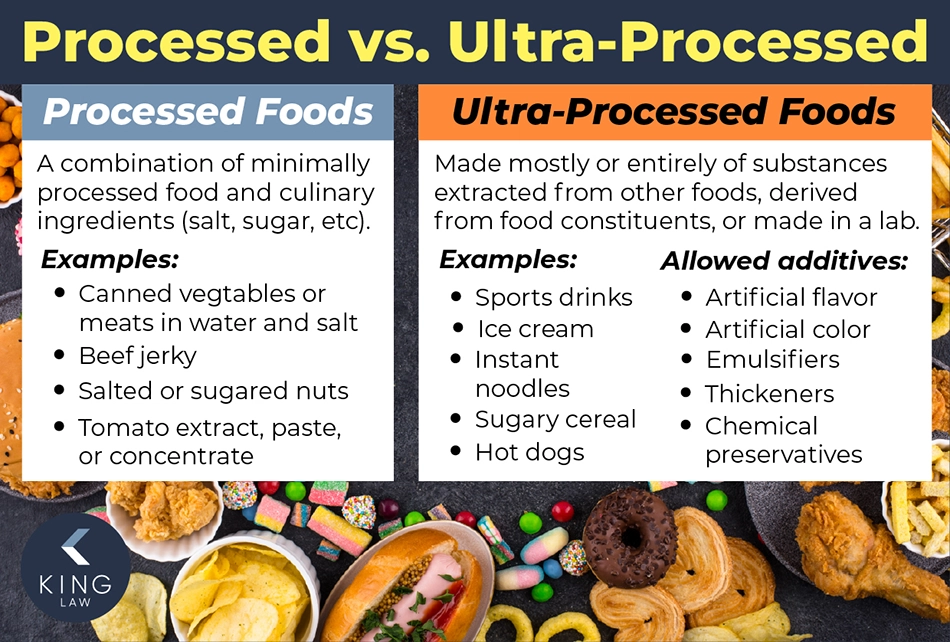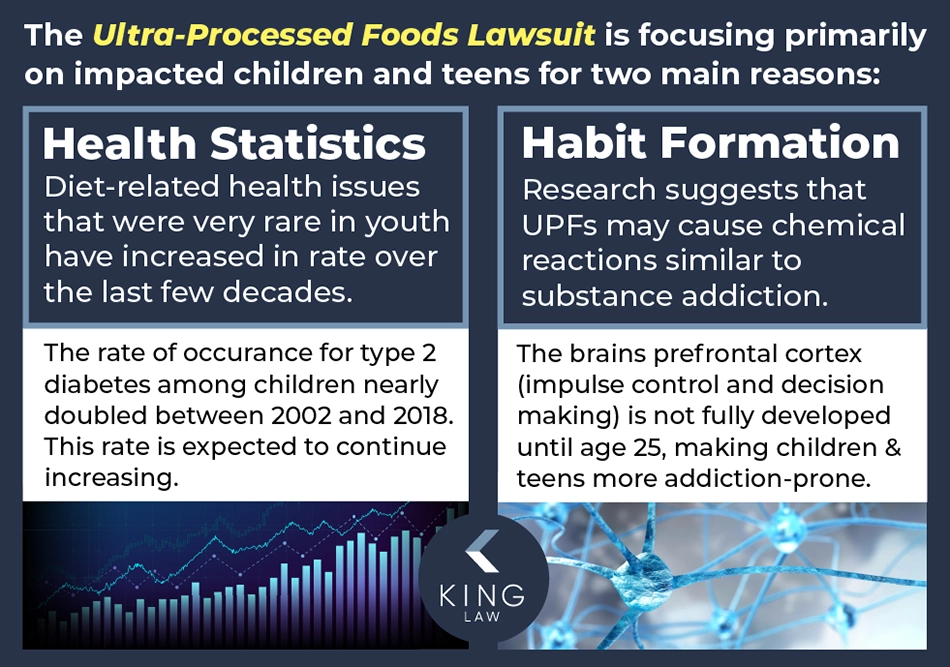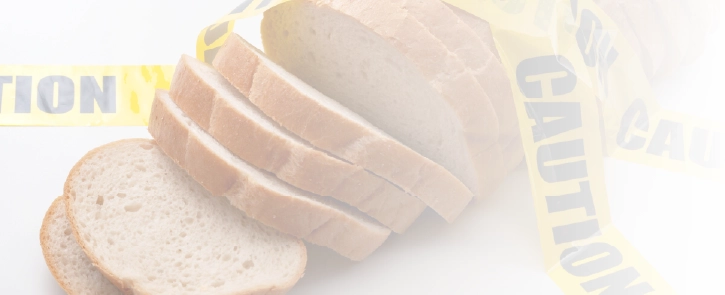
People who consumed ultra-processed foods and developed a serious medical condition as a child may be eligible to file a lawsuit against food manufacturers. Ultra-processed food lawsuits are a way for people diagnosed with fatty liver disease or type 2 diabetes to hold large food conglomerates accountable. In this article, we will explore who is qualified to file an ultra-processed food lawsuit and when it is time to take action.
About Who Qualifies to File an Ultra-Processed Foods Lawsuit:
Eligibility Criteria to Qualify for an Ultra-Processed Foods Lawsuit
Qualifying Medical Conditions for an Ultra-Processed Foods Lawsuit
What Types of Foods or Ingredients Are Involved in the Litigation?
Can Adults File an Ultra-Processed Foods Lawsuit?
How the Timing of Diagnosis Impacts Your Ultra-Processed Foods Claim
Who Does Not Qualify to File An Ultra-Processed Food Lawsuit?
What Evidence Do I Need to Qualify for a UPF Lawsuit?
Eligibility Criteria to Qualify for an Ultra-Processed Foods Lawsuit
In recent years, scientists are understanding how harmful ultra-processed foods are to the health and well-being of consumers, particularly children. Studies have linked ultra-processed food consumption to type 2 diabetes and non-alcoholic fatty liver disease. In the past, these conditions were rarely diagnosed in children; however, the rates have skyrocketed since the advent of ultra-processed foods. Some people harmed by these foods may be able to file a lawsuit against food manufacturers.
The eligibility criteria our firm uses to see if someone qualifies for compensation include the following:
- The person was diagnosed with type 2 diabetes or non-alcoholic fatty liver disease.
- The person was 18 or younger when they were diagnosed.
- For at least two years, the person regularly consumed ultra-processed foods before they were diagnosed.
- The diagnosis occurred after 1985.
The types of ultra-processed foods that the person could have consumed include energy drinks, processed meats (like hot dogs and deli meats), soda, frozen dinners, candy bars, chips, packaged snacks, crackers, and packaged bread. Additionally, the person should be able to prove that about a third of their diet contained ultra-processed foods for at least two years.

Qualifying Medical Conditions for an Ultra-Processed Foods Lawsuit
Currently, the medical conditions that someone may have to qualify to file a lawsuit against an ultra-processed food company are pediatric type 2 diabetes, childhood obesity (in some cases), and non-alcoholic fatty liver disease. To qualify based on childhood obesity, the person should also have a type 2 diabetes or non-alcoholic fatty liver disease diagnosis. The person must have received these diagnoses during childhood (age 18 or under).
Type 2 Diabetes
One of the conditions at issue in the UPF lawsuit is childhood type 2 diabetes. The person should have received a diagnosis during childhood and have medical records and strong evidence showing a connection between their diagnosis and their UPF intake.
Type 2 diabetes is a serious condition where the person’s body cannot make and use insulin to regulate its blood sugar levels. Ultra-processed foods contain unhealthy and sometimes artificial sugars, carbohydrates, flavors, and other ingredients, which can disrupt how someone’s body converts food into energy. UPFs have been associated with an increase in adipose (fat) tissue in children and adults, which leads to obesity, a known risk factor for type 2 diabetes.
Type 2 diabetes was traditionally thought of as a condition that only impacted adults after years of an unhealthy diet and lifestyle. However, more and more children are being diagnosed with this condition, and many believe ultra-processed foods are to blame. Studies consistently show that an increase in ultra-processed food consumption raises someone’s risk of type 2 diabetes.
Non-Alcoholic Fatty Liver Disease
Another condition that may qualify someone for compensation in the ultra-processed food lawsuit is non-alcoholic fatty liver disease diagnosed during childhood. The person should have medical records to support this diagnosis, such as imaging or liver function test results.
Non-alcoholic fatty liver disease occurs when fat tissue develops around the liver, which can lead to complications like scarring of the liver. Increased intakes of high-fructose corn syrup, sugar, fat, and artificial ingredients, like those in ultra-processed foods, are known drivers of non-alcoholic fatty liver disease. Ultra-processed foods contain large amounts of these harmful substances, and many believe it is causing children to develop non-alcoholic fatty liver disease.
What Types of Foods or Ingredients Are Involved in the Litigation?
The ultra-processed food lawsuit is focused on a variety of harmful ingredients and foods that are known drivers of type 2 diabetes and non-alcoholic fatty liver disease. Some of the ultra-processed foods that are being examined in the case include junk foods and other snacks:
- Sodas and energy drinks, including sugary and sugar-free kinds
- Processed meats (e.g., sausage, ham, and deli meat)
- Packaged breads and pastries
- Cereals
- Some dairy-free milk
- Protein and snack bars
- Candy bars and sweets
- Frozen dinners
- Chips, cookies, crackers, and other snacks
Harmful ingredients that have been found in ultra-processed foods include the following:
- Corn syrup and high-fructose corn syrup
- Hydrogenated oils
- Butylated hydroxyanisole (BHA) and butylated hydroxytoluene (BHT)
- Food dyes
- Monosodium glutamate
- Sulfites
- Potassium bromate
- Nitrites and nitrates
- Titanium dioxide
- Emulsifiers
- Stabilizers
These and other ingredients are often added to UPFs to make them tastier and last longer on the shelves. However, they are harmful to human health and result in an imbalanced and fake food product that can disrupt the body’s normal functions.
Can Adults File an Ultra-Processed Foods Lawsuit?
Adults—e.g., parents and legal guardians—can file claims on behalf of children and teenagers who were harmed by ultra-processed foods. The adults can bring lawsuits on their own behalf if they meet the eligibility criteria. For example, the adult would need to show that their problematic ultra-processed food intake began in childhood and led to them being diagnosed with type 2 diabetes or non-alcoholic fatty liver disease.

How the Timing of Diagnosis Impacts Your Ultra-Processed Foods Claim
Key factors about whether someone can qualify to file an ultra-processed food lawsuit are the timing of their diagnosis and when they file their claim. Currently, these cases are focusing on childhood type 2 diabetes and non-alcoholic fatty liver disease. So, the person must have eaten ultra-processed foods, have received one of these diagnoses before they turned 18, and meet the other eligibility criteria.
Additionally, people must file their claims before the state-specific statute of limitations expires. While each state has a different set of due dates, many ask people to file cases within two to four years. However, the statute of limitations may not begin to run until the person reaches a certain age (e.g., 18). Filing a case before this deadline expires helps to preserve evidence while it is fresh and protects the person’s legal rights.
Who Does Not Qualify to File An Ultra-Processed Food Lawsuit?
Not everyone who ate or eats ultra-processed foods is eligible to request compensation. Here are some examples of when someone may not qualify to sue:
- The person did not receive a UPF-related diagnosis, such as type 2 diabetes or non-alcoholic fatty liver disease.
- The person did not eat enough ultra-processed foods when they were a child.
- Their medical conditions are due to unrelated causes, such as excessive drinking.
- The person’s diagnosis was not due to the foods they ate when they were a child.
Every case is unique, and there are situations where someone may still be entitled to file a lawsuit even if they do not meet all the eligibility criteria discussed in this article. Our team can help you understand if you are eligible to file a lawsuit. Contact us to discuss the specifics of your potential case.
What Evidence Do I Need to Qualify for a UPF Lawsuit?
In order to file a claim because of ultra-processed food consumption, you need to have evidence to prove you are entitled to damages. Some of the materials you can use to support your case include the following:
- Diagnostic and testing results from your doctor showing that your child has type 2 diabetes or non-alcoholic fatty liver disease
- Financial records—such as receipts or bills—showing that you purchased UPFs or vouchers for your child to eat UPFs at school
- Food and school lunch records proving your child ate UPFs and in what amounts
- Packaging and labels of foods your child ate at home
- Testimony from your child’s pediatrician to explain how their eating habits impacted their health
A knowledgeable legal team can help you figure out what evidence you can use to strengthen your claim. We can also help you gather this by sending in requests to the appropriate agencies or reviewing documents you have in your possession.
Find Out If You Qualify for a UPF Lawsuit with King Law
Ultra-processed foods are everywhere in America’s grocery stores, pantries, and institutions, and they are harming our nation’s children. Many believe that UPF manufacturers have been untruthful about the dangers of these products and their actual health benefits. Because of their failings, some children develop dangerous conditions like type 2 diabetes and non-alcoholic fatty liver disease.
If you want to know if you qualify to file an ultra-processed food lawsuit, reach out to King Law today to schedule a free consultation. You can reach us by calling (585) 316-0536 or by filling out an online contact form. We can carefully review your medical history and UPF intake to determine if you are eligible for compensation. We do not charge clients any upfront legal costs to handle their UPF cases, and we do not receive a cent unless we win the case for the client.

